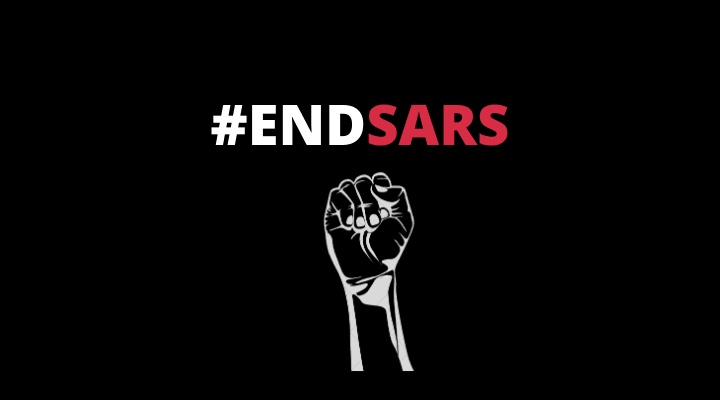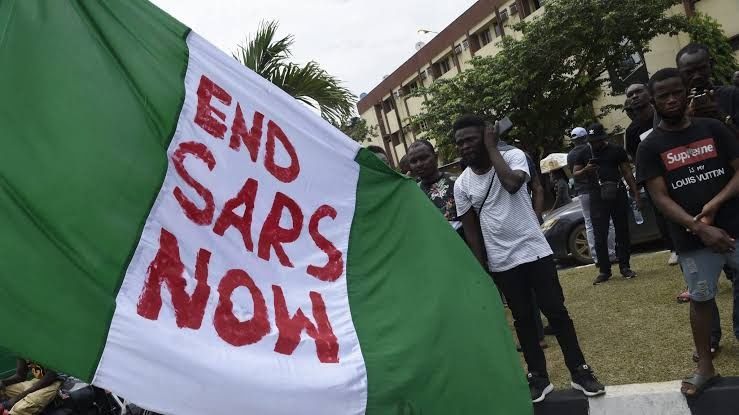#EndSARS: An Introspection Into Events Of Oct. 2020
A look into the activities that shaped Nigerians’s protest against police brutality and the shootings that were part of the 2020 #EndSARS protests.

In what was referred to as a decentralised agitation against extrajudicial killings and brutalities by the now-defunct Special Anti-Robbery Squad (SARS) unit of the Nigeria Police, Nigerian youths took to the streets in Oct. 2020 under the banner of #EndSARS.
Although the exact moment of cohesion is hard to pinpoint, some young Nigerians on Oct. 8, 2020, protested at Alausa, the seat of the Lagos state government.
As the protest persisted for days, the state’s House of Assembly had an emergency parliamentary sitting to deliberate the petitions of #EndSARS protesters. By then, the protest had started in other states, attracting independent support of non-governmental organisations, celebrities, and human right activists.
On Oct. 11, 2021, Muhammed Adamu, Nigeria’s Inspector-General of Police (IGP) at the time announced the dissolution of SARS, saying all officers serving within the unit would be redeployed immediately. His announcement, unfortunately did not meet Nigerians well, apparently because that was not the first time such an announcement would be made.
In response to Adamu, protesters made some demands, requesting an Executive Order and a public announcement by the President that SARS would be scrapped. Days later, the Nigerian authorities said they have accepted the demands by the protesters including the scrapping of the notorious SARS squad.
Similarly, Nigerian Vice President, Yemi Osinbajo, directed all the state governments to set up a judicial panel of enquiry, which would investigate all the allegations of brutality and extrajudicial killing against the SARS squad.
As the protest lingered, Nigerians in diaspora, including some international actors, joined in the agitation, calling for a reform in the police sector.
The Lekki shooting
After several reported cases of violence between security operatives and hoodlums on protesters, Babajide Sanwo-Olu, Governor of Lagos State declared a 24-hour curfew effective from 4:00 p.m. on Oct. 20, 2020.
Hours later, operatives of the Nigerian Army arrived at the scene of the protest at Lekki Toll-gate where they opened fire on the peaceful protesters.
There were reported cases of deaths and injuries which the state government initially denied. After pictorial and video evidence, Lagos Government admitted that 25 persons were injured while two persons died.
Amnesty International said at least 12 people were killed. The killings led to the full hijack of the protest by hoodlums afterward. They vandalised public properties and stores around the country, carting away several items including foodstuff.

Nigeria’s Vice President, Yemi Osinbajo, directed all the state governments to set up a judicial panel of enquiry–which would investigate all the allegations of brutality and extrajudicial killing against the security operatives with a proposal that a victim support fund should be set up by states to compensate for the injustice suffered by victims.
A total of 29 out of 36 states constituted judicial panels of enquiry with 2,744 petitions received. HumAngle reported how the setting up of a judicial panel facilitated justice for these victims.
After receiving petitions relating to the shooting, the Lagos State Judicial Panel resolved to reopen the toll gate– a decision that was kicked against by the public.
HumAngle reported that some Nigerians expressed their readiness to stage a protest on Feb.13 —#OccupyLekkiTollGate— as they considered the development a breach of trust by the panel set up to deliver justice to the victims of police brutality.
In reaction, the Nigerian government said that it would not allow any protest that may result in violence. Humangle also reported how the security operatives had rendered several shanty residents homeless as part of measures to forestall the protest.
Armed officers were deployed to the toll gate to stop the protest from holding. Peaceful protesters, including popular celebrities, who came out for the demonstration were arrested, beaten, and harassed by the operatives.
Since the demonstration in February, there have been several reports on vandalism, compensation of victims across states, scholarship to a baby born in detention, economic impact of protest on Nigerians and crimes, among others.
Recently, a forensics company confirmed that bullets fired from firearms during the #EndSARS protests in Lagos on Oct. 20, 2020 were from the Nigerian Army. This came after several denials by the armed forces on shooting anyone at the protest.
Brutality has not ended
HumAngle reported how a police officer in Osun State, Southwest Nigeria, killed a motorcyclist in Osogbo. Also, the police were also alleged to have killed two friends in Kano Municipal Area, Kano State, Northwest Nigeria.
Angry residents of Kwalamba in Adamawa State, Northeast Nigeria, also protested against the abuses and brutality by soldiers deployed to the town.
Protesters of the June 12 Democracy Day against bad governance were also harassed by security operatives in Lagos, Oyo, Abuja and some Southeast states.
Human rights lawyer, Ayo Ademiluyi, said brutality by the security operatives against Nigerians has not stopped despite a judicial panel set up in many states.
“The panel would definitely come and go but does that mean that within the one year full circle that we have come to, police brutality and killings have ended? The answer is No.”
When asked if justice has been given to the victim, he said “Justice can not be monetized. Giving some few million naira to some few individuals is just more or less scratching the surface.”
However, Tope Temokun, human rights lawyer, said that one effective way to ensure that the brutality by security operatives is reduced is for the public to continue protesting against such action.
“People that have the state powers in their hands, when they are misusing or abusing it, we must continue to place that demand on them vigorously,” Temokun said.
“People must be tired and continue to build their feet. That culture of protest is what people need and we must continue to encourage it.”
Support Our Journalism
There are millions of ordinary people affected by conflict in Africa whose stories are missing in the mainstream media. HumAngle is determined to tell those challenging and under-reported stories, hoping that the people impacted by these conflicts will find the safety and security they deserve.
To ensure that we continue to provide public service coverage, we have a small favour to ask you. We want you to be part of our journalistic endeavour by contributing a token to us.
Your donation will further promote a robust, free, and independent media.
Donate HereStay Closer To The Stories That Matter




